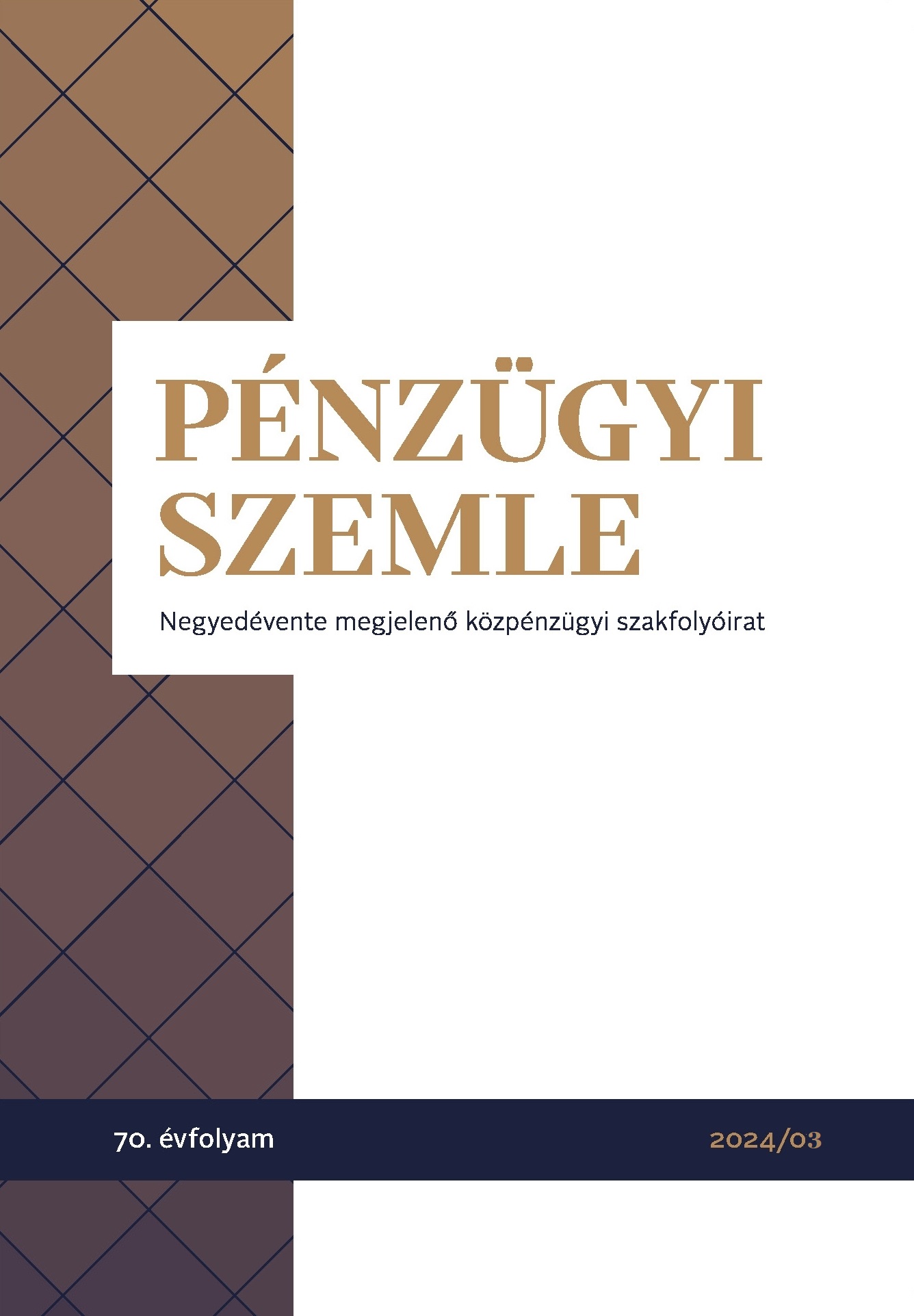Changes in the understanding of competitiveness and the conditions for improving Hungarian competitiveness in the light of these changes
DOI:
https://doi.org/10.35551/PFQ_2024_3_1Keywords:
national competitiveness, national wealth, sustainability, resilience, human capital, D24, F63, I28, O31, O34, Q01Abstract
The aim of this article is to present the changes in the literature and practice of competitiveness, pointing out that a distinction must be made between competitiveness at the firm level and competitiveness at the national level, both in terms of objectives and methods. On the other hand, it highlights the new elements that have been introduced into the understanding of competitiveness due to geopolitical, social and environmental changes, and which are becoming more prominent in our time due to technological change. The article quotes, without claiming to be exhaustive, the main findings of recent studies by the best-known competitiveness research organisations, illustrating the differences in interpretation between them. Occasionally, findings on domestic performance are also discussed. The article did not aim to provide a comprehensive analysis of Hungarian competitiveness based on proprietary research, as it considers the presented MNB Competitiveness Report as a good research basis for describing the competitiveness situation and for developing a national competitiveness strategy. However, it does point out some additional indicators that should definitely be included in a national competitiveness strategy. It argues that the aim of improving national competitiveness should not be merely to improve economic outcomes, such as GDP. The central issue of improving competitiveness can only be the harmonious expansion of all elements of national wealth together. Therefore, the Hungarian National Competitiveness Strategy should set development targets for those elements of wealth where Hungarian competitiveness performance is weak. The article lists these in the summary.
References
Acemoglu, D, Robinson J.A. (2012): Why Nations fail. Crown Publichers, New York
Berkes, F. (2023): Advanced Introduction to Resilience. Edward Elgar Publishing, Cheltenham, UK, Northampton, MA. USA
Bris A. (2021): The Right Place. How National Competitivenes Makes or Breaks Companies Routledge
Chikán A., Czakó E., Kazainé Ónodi A. (2006): Gazdasági versenyképességünk vállalati nézőpontból - Versenyben a világgal 2004-2006 kutatási program. Zárótanulmány. Budapesti Corvinus Egyetem, Vállalatgazdaságtan Intézet. Versenyképesség Kutató Központ, 2006 december
Csath M. (szerk) 2019: A versenyképességmérés változásai és új irányai. Dialóg Campus Kiadó, 2019 Budapest
Csath M. (szerk) 2020a: Versenyképesség: új elméleti és módszertani közelítések. Ludovika Egyetemi Kiadó, 2020. Budapest
Csath M. (szerk) 2020b: Versenyképességi dilemmák a digitalizáció és robotizáció korában. Ludovika Egyetemi Kiadó 2020. Budapest.
Csath M. (szerk) 2021: Versenyképességi mozaik. Akadémia Kiadó, Budapest
EBRD 2024: Sustainability Report 2023. London, UK. https://www.ebrd.com/sustainability-report-2023 Letöltve: 2024.05.29
EC 2024: Communication from the Commission to the European Parliament, the Council, the European Economic and Social Committee and the Committee of the Regions: The 2024 Annual Single Market and Competitiveness Report, Brussels, 14.2.2024. com (2024) 77 final
EC 2024a: Commission Staff Working Document. Communiction from the Commission to the the European Parliamant, the Council, the European Economic and Social Committee and the Committee of the Regions. The 2024 Annual Single Market and Competitiveness Report Brussels, 14.2.2024. SWD (2024) 78 final
EIB 2023: EIB Investment Survey-European Union Overview 2023. október 19. Luxemburg. Https://www.eib.org/en/publications/20230285-econ-eibis-2023-eu Letöltve: 2024.06.04.
EIB 2024: EIB Investment Report 2023/2024. Transforming for competitiveness 2024. február 7. Luxemburg.
https://www.eib.org/en/publications/20230323-investment-riport-2023 Letöltve: 2024.06.04
Eurostat 2024. március 22: Enterprises by detailed NACE Rev. 2 activity and special aggregates. https://ec.europa.eu/eurostat/databrowser/view/sbs_ovw_ act_custom_11732738/default/table?lang=en Letöltve: 2024.06.09.
Haskel J., Westlake S. (2018): Capitalism without Capital. The rise of the intangible economy. Princeton University Press. Princeton & Oxford
IMD 2023: World Talent Ranking 2023. Institute for Management Development. Lausanne, Svájc
Lanvin, B. (2023): Future Readiness Economic Index 2023. Descartes Institute Google for the Future (Commissioned by Google. In collaboration with Communications Regulatory Authority of the state of Qatar. Genf Svájc. https://futurereadinessindex.com/2023 Letöltve: 2024.05.29
Lanvin B., Monteiro, F. (szerk) 2023: The Global Talent Competitiveness Index. INSEAD, Descartes Institute for the Furute and the Human Capital Leadership Institute. Fontainebleau, Franciaország 2023
Malecki, E.J. (2007): Cities and regions competing in the global economy: knowledge and local development policies. Environment and Planning C: Government and Policy 2007. volume 25, pages 638-54
Milberg W., Houston E.: The High Road and the Low Road to International Competitiveness. Carnegie Council for Ethics in International Affairs. 1999. október 9. https://www.carnegie council.org/media/article/the-high-road-and the-low-road-to-international-competitiveness
MNB, 2019: A jövő fenntartható közgazdaságtana (Szerk. Virág Barnabás) Magyar Nemzeti Bank 2019. Budapest
MNB 2019a: Versenyképességi program, 330 pontban MNB. Budapest
MNB 2023: Versenyképességi Jelentés 2023 MNB. Budapest
Palotai D., Virág B. (2016): Versenyképesség és Növekedés. Magyar Nemzeti Bank 2016
Porter, E.M. (1985): Competitive Advantage. The Free Press
Schwab, K. Zahidi S. (2020): The Global Competitiveness Report. Special Edition 2020. How Countries are Performing on the Road to Recovery. World Economic Forum. Geneva, Schwitzerland
Statista 2024: EU share of world exports and imports 2002-2023. Published by Olan McEvoy Apr 24, 2024 https://www.statita.com/statistics/136400/eu-international-trade-world exports-imports Letöltve: 2024.06.04
Szentes, T. (2005-2006): Fejlődés, Versenyképesség, Globalizáció I.-II. Akadémia Kiadó 2005, 2006. Budapest.
Vietor R. H.K. (2007): How Countries Compete. Harvard Business School Press. Boston Massachusetts.
WEF 2024: The Future of Growth Report 2024,. Insight Report. Genf, Svájc. January 2024. weforum.org/publications/the-future-of-growth-report Letöltve: 2024.06.05
Downloads
Published
How to Cite
Issue
Section
License
Copyright (c) 2024 Public Finance Quarterly

This work is licensed under a Creative Commons Attribution 4.0 International License.
Authors assign copyright to Pénzügyi Szemle / Public Finance Quarterly. Authors are responsible for permission to reproduce copyright material from other sources.












